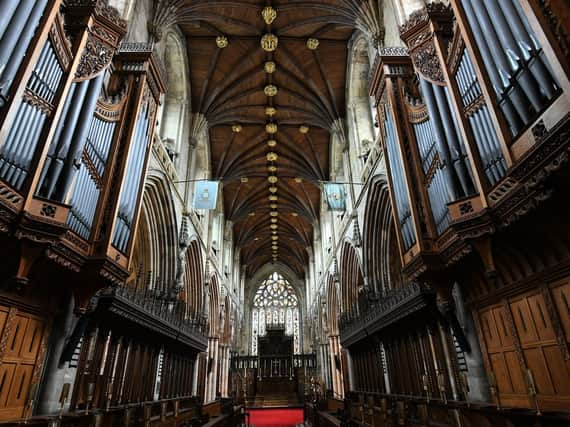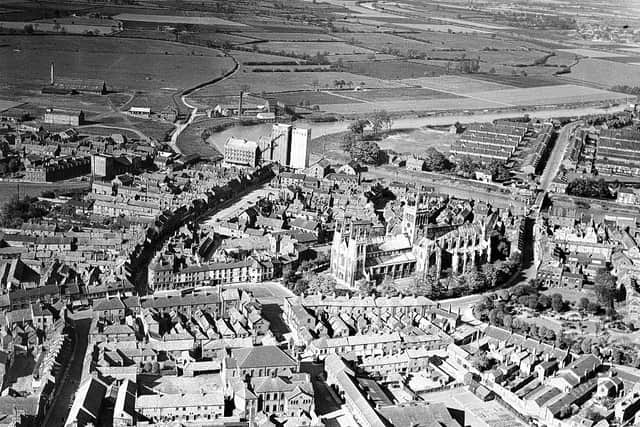The history of Selby, once the port of the West Riding and reputed birthplace of Henry I
This article contains affiliate links. We may earn a small commission on items purchased through this article, but that does not affect our editorial judgement.


It is believed that Henry I was born in Selby, and as Royal heritage goes that’s not a bad claim to fame. He isn’t the only well known person from this corner of Yorkshire who has gone on to make their mark in the world, many of them becoming the movers and shakers and opinion-makers of their day.
One of them even took the name of his place of birth with him when he went. Robert of Selby set off for Europe and ended up in southern Italy. Only his was not a pleasant package holiday, here he was fighter, a wily diplomat, a confidant of kings and princes, and a considerable thorn in the side of many popes. He was also chancellor to the King of Sicily.
Advertisement
Hide AdAdvertisement
Hide AdSo deft was he at juggling multitudes of facts and figures that legend has it that when Robert was overseeing the election of a new bishop in the town of Avella he called for each of the three candidates individually, and impressed on them how important the role was in terms of status, and wealth.


They all agreed and each paid Robert a hefty bribe, to ensure their success. Robert then called a high-powered ecclesiastical court, and fulsomely denounced the venal trio. The court then gave an independent and well-respected abbot the bishop’s mitre.
You can’t talk about Selby’s history without mentioning Henry I, of course. He was reputedly born here in 1068, only two years after the Norman Conquest, and enjoyed a long life, for he was 67 when he died. But he didn’t leave any surviving male heirs, and passed his throne on to his daughter, Matilda.
This precipitated a long and bloody civil war between Matilda and her cousin, Stephen. She had the last laugh, for it was her son who finally ascended the throne, as Henry II.
Advertisement
Hide AdAdvertisement
Hide AdSelby was for many years a traveller’s nightmare. The main rail line from London to the North went over the River Ouse via a swing bridge, and when shipping went up and down the water – as it did in great numbers at one time – the bridge had to remain open to allow passage. Don’t forget that Selby was known as “the Port of the West Riding”, despite it being many miles from the sea as the crow flies.
The A19 also went through the middle of the town – straight up the High Street, and past the Abbey. Only this was hindered not just by the Ouse, but also by a level crossing for the railway. Things were vastly improved and boiling frustrations calmed when the road by-pass was finally built, and the main line shifted well to the west, leaving Selby out of the loop.
Today, it’s a great place to be if you want to commute to places like Leeds, York or Hull. There’s good shops and a high street with many independent traders, plus a proper community spirit.
The heart of the town is (and has been since Anglo Saxon times) the Abbey, which is actually the Parish Church, and far bigger than some of England’s cathedrals. This present building was founded in 1069 by Gilbert of Auxerre, which ties in neatly with the birth of the baby who was later to assume the crown.
Advertisement
Hide AdAdvertisement
Hide AdIt managed to survive the dissolution of the monasteries, a good bashing-about by Cromwell’s men, and the collapse of the central tower in 1690. It also managed to survive Gilbert Scott’s Victorian improvements. A terrible fire, in 1906, however, ravaged much of the place.
Miraculously, the great East Window, with its priceless 14th century glass was spared, as was the Washington window of a century later. This shows the coat of arms of George Washington’s ancestors, which became the template for the heraldic device of the District of Columbia, and later, the flag of the United States itself.
Only a stone’s throw from the much-loved Abbey is the magnificent medieval Abbott’s Staithe. It is a place of some mystery, not least because much of it is hidden from view. That it served as a grain store is beyond doubt, but it is also likely that it may have been a dormitory building for many of the monks, and that it played a big role in their day-to-day life. It is a remarkable place and the only building of its kind in the country.
The Selby Civic Society is a thriving group dedicated to discovering more about the history of the town and preserving its heritage. Michael Dyson is its chairman and also the current mayor.
Advertisement
Hide AdAdvertisement
Hide AdHe recalls the days when ships of over 10,000 tonnes were launched from Cochran’s shipyard – which closed in 1992 - and the importance of the British Oil and Cake Mills site at Olympia Park. Part of that business continues under new management, but the rest of the area is part of a huge redevelopment plan for new homes, leisure facilities, and an area for small industry.
Michael’s own favourite corner of the town is close to the abbey, in Park Street and The Crescent. Here, elegant buildings stand on land once owned by Lord Londesborough, a Victorian nobleman who, reputedly, was rather good at losing money at the gaming tables.
“They’ve got style, and they’ve got elegance”, says the mayor, “and what we want to do is to retain all of our notable buildings, putting them into historic context. We also must make sure that we have the very best of contemporary architecture to pass on to future generations.” It is, he says, a balancing act. “We have to look forward, while celebrating a colourful past.”
For more stories from the YP Magazine and The Yorkshire Post features team, visit our Facebook page.
Advertisement
Hide AdAdvertisement
Hide AdEditor’s note: first and foremost - and rarely have I written down these words with more sincerity - I hope this finds you well.
Almost certainly you are here because you value the quality and the integrity of the journalism produced by The Yorkshire Post’s journalists - almost all of which live alongside you in Yorkshire, spending the wages they earn with Yorkshire businesses - who last year took this title to the industry watchdog’s Most Trusted Newspaper in Britain accolade.
And that is why I must make an urgent request of you: as advertising revenue declines, your support becomes evermore crucial to the maintenance of the journalistic standards expected of The Yorkshire Post. If you can, safely, please buy a paper or take up a subscription. We want to continue to make you proud of Yorkshire’s National Newspaper but we are going to need your help.
Postal subscription copies can be ordered by calling 0330 4030066 or by emailing [email protected]. Vouchers, to be exchanged at retail sales outlets - our newsagents need you, too - can be subscribed to by contacting subscriptions on 0330 1235950 or by visiting www.localsubsplus.co.uk where you should select The Yorkshire Post from the list of titles available.
Advertisement
Hide AdAdvertisement
Hide AdIf you want to help right now, download our tablet app from the App / Play Stores. Every contribution you make helps to provide this county with the best regional journalism in the country.
Sincerely. Thank you.
James Mitchinson